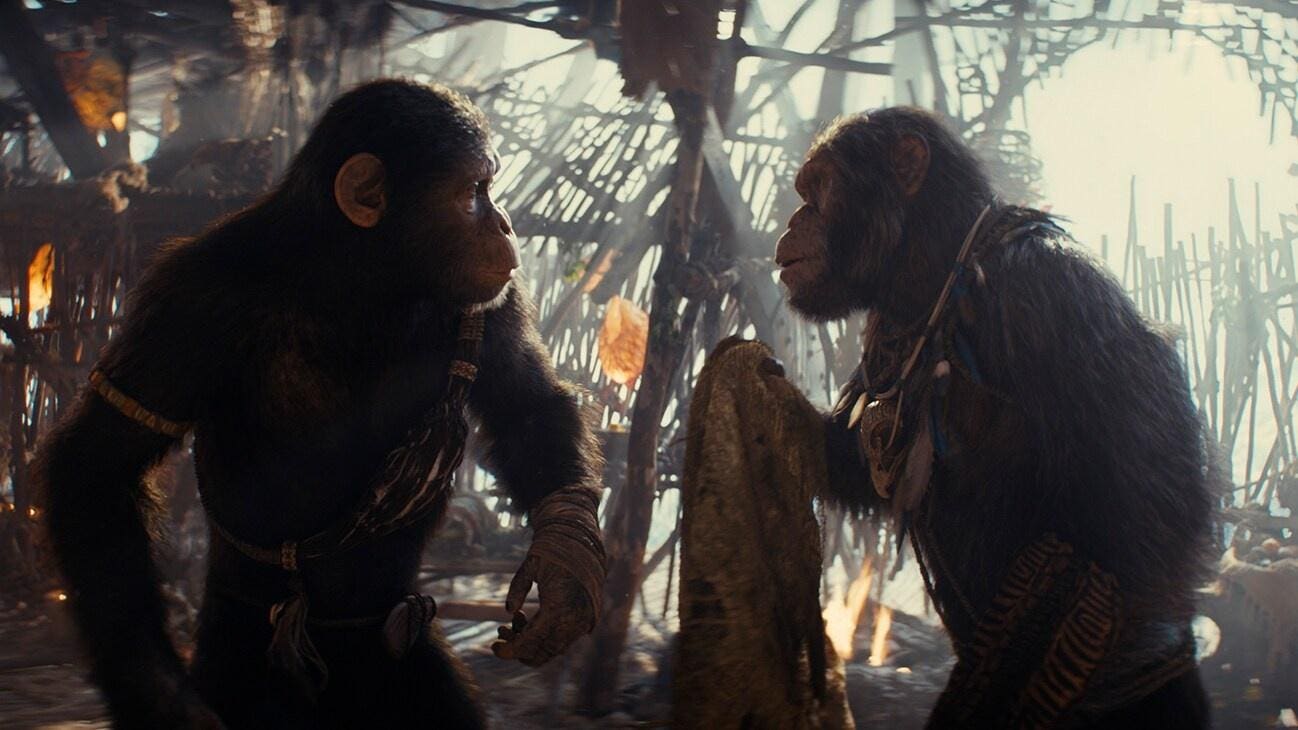The Fall Guy unfortunately stumbled last weekend, but this weekend Kingdom of the Planet of the Apes kicks off the 2024 summer movie season in grand style and potential blockbuster box office with a glorious new chapter.
Owen Teague and Neil Sandilands star in “Kingdom of the Planet of the Apes.”
The Financials
Kingdom of the Planet of the Apes is currently projected to finish somewhere between $130-140 million, which is fine, but that might hold it to $400 million range, plus or minus, and it really needs to play higher than that.
Premium formats have been overperforming — there just aren’t enough to meet enthusiastic audience demand — and should help raise Kingdom of the Planet of the Apes to at least $50 million stateside this weekend, and after seeing it I think good word of mouth will carry it toward $55 million.
Overseas should be even more lucrative for Kingdom and could approach $100 million with its all-markets debut, but for now I’m expecting closer to $90 million territory. I won’t be surprised to see this opening number a bit higher or lower, but (based on having seen it) I will be surprised if it doesn’t have strong weekly holds and wind up legging out to at least $250 million and hopefully closer to $300 million.
On the other hand, if previews and pre-sales wind up heavily front-loaded, that could result in a domestic weekend closer to $45 million territory, and similar international results would put it around $75 million in other markets, for a worldwide low-end outcome of about $120 million. In that situation, I’d expect a final gross closer to $350 million worldwide, a much softer performance than hoped.
So, the closer to $150 million the better, as that’s where the real indications would come that the franchise is ripe for a revival and can pull down $500 million or more. A performance under $400 million, meanwhile, would suggest Apes is yet another previously popular franchise for which audience interest has faded too much to expect modern blockbuster results (it took Ghostbusters a couple of films to get that message, and it’s still not clear the lesson has sank in yet).
Not that I expect Kingdom of the Planet of the Apes to flop like Ghostbusters: Frozen Empire did earlier this year (it’s still below $200 million globally as I write this). The point is, we still haven’t clearly identified where certain legacy franchises reside within broader public awareness and interest, and Apes is one of them.
The key ingredient is usually whether the films tell a good story and make the audience feel they got their money’s worth of entertainment. That’s why Dune: Part Two, Godzilla x Kong, and Kung Fu Panda 4 were rewarded and continue adding to their box office tally. And it’s why I think audiences will reward Kingdom of the Planet of the Apes as well.
The Review
I grew up watching and adoring Planet of the Apes movies, TV show, and animated series (all of which I own on home entertainment, even the cartoons). And I’ve especially been a big fan of the modern Planet of the Apes movies, as my coverage of Edgar Wright’s and Matt Reeves’ trilogy films demonstrate. You can read my past coverage of the making of Dawn of the Planet of the Apes here, and watch my previous interviews with Matt Reeves, Andy Serkis, and Toby Kebbell here.
My love for Dawn of the Planet of the Apes is on par with my feelings for The Dark Knight, a film it mirrors in many ways — including qualitatively — and it’s among the worst Oscar snubs that this series (and particularly Dawn) wasn’t awarded any statuettes for its revolutionary visual effects, or even nominated for the brilliant performances and directing.
So whomever took over and continued the series was going to have a high bar to cross. Wes Ball’s work on the Maze Runner trilogy earned him fans, and the first movie in that series stands out. When Ball was announced, I was willing to take a “wait and see” approach and wish him all the best, and I was simply happy to hear another film was coming.
That said, I was also frankly unsure what to expect from him taking over after Reeves’ powerful work on the series and the glorious gut-punch of War for the Planet of the Apes. Ball hadn’t yet demonstrated the expansive vision and deeper complexity with character arcs that drove previous modern Apes movies, and it was unclear where the story would go now that the main characters and conflicts were all completed.
With Kingdom of the Planet of the Apes, Ball has taken a big leap into a higher tier of directing and filmmaking, not just because of the franchise pedigree but because the filmmaker did the impossible — Kingdom of the Planet of the Apes isn’t just a worthy successor to the previous trilogy, it is a deeply moving, emotionally powerful, complicated examination of family, community, trust, and sharing this world together.
This isn’t just Ball’s best film by a wide margin, it’s as compelling, resonant, and thrilling as the rest of the modern franchise.
Screenwriter Josh Friedman has a tremendous résumé, including Steven Spielberg’s War of the Worlds, James Cameron’s Avatar: The Way of Water, and creating/writing the series Terminator: The Sarah Connor Chronicles
Here in Kingdom, Friedman takes time building up the world and relationships within each setting and for his various new characters. The story is a methodically paced combination of the road-trip aspects of War for the Planet of the Apes with the worldbuilding, intricate character motivations and conflicts of Dawn of the Planet of the Apes, and a whole new set of elements and ideas for the growing tribes and cities built by different groups of apes slowly coming into increased contact — and conflict — with one another.
The cast are all excellent this time around again (although I won’t deny that I miss Andy Serkis, Karin Konoval, and Terry Notary). Owen Teague does an admirable job taking over lead duties, and he give Noa his own sense of personality, doubts, and perception of his world (including plenty that’s mistaken), while still embodying the essential goodness and intelligence of Caesar. He is young, but it’s clear he will grow into his role in the tribe and become a leader.
Peter Macon steals every scene he’s in as Raka, an orangutan who follows the teachings of Caesar and wants to revive them among new generations, because those teachings are increasingly misunderstood and outright twisted to excuse and enable things Caesar would never have allowed or endorsed. Macon’s performance is funny, earnest, and plants many seeds in the mind and behavior of Teague’s Noa, the payoffs always feeling earned and often causing viewers at my press screening to applaud.
Freya Allan as Nova/Mae is an enigma, and neither we nor Noa can be certain of her intentions. Allan gives Mae a mix of trustworthiness and slyness that keep us off balance and add a lovely element of conflicted feelings and assumptions mirroring Teague’s/Noa’s.
Kevin Durand (whom you may have seen recently in the current horror film release Abigale) is the main antagonist, and while his screen time is relatively limited in the nearly two-and-a-half hour film, he delivers a grand personality as a leader who wants to take Caesar’s place as ruler of apes. His is a more fascistic approach to the motto “Apes Together Strong.”
Kingdom of the Planet of the Apes is also a visual masterpiece, the WETA team having miraculously topped themselves yet again. You’ll easily forget you’re watching CGI, and you’ll take to heart the reality of the apes as real living characters. The movement, detail, mouth movements when speak, all of it is amazingly realized within a much larger portrayal of ape civilization than we’ve ever seen before in the Planet of the Apes.
Many fans (including me) expected Kingdom to hurry into the story from the original 1968 Planet of the Apes, in which human astronauts return to Earth to find the mind-bending changes, since Rise of the Planet of the Apes and Dawn of the Planet of the Apes seemed to set up so much of the plotting for that story and even tried to introduce one of the female leads from that storyline.
However, that is simply not the case. But it turns out it works better, because having apes grow intelligent and then take over the world and successfully extinguish knowledge and evidence of prior human civilization all within a single generation or two would’ve felt rushed after all.
But worry not, dear readers — Kingdom of the Planet of the Apes dispenses with/”evolves” those previous setup bits easily and with a nice touch of humor that make the backstory and details even richer.
This is also the first film of the modern series to end in a way directly setting up the next chapter in the Apes saga. Whether that leads us into a retelling of the classic “astronauts return home” portion of the story, or some other unexpected series of events (there are several such moments and reveals in Kingdom of the Planet of the Apes), time will tell.
For now, fans can rejoice that Kingdom of the Planet of the Apes is the sequel we all hoped for, not just carrying the series forward but building toward something even greater and more epic. Congratulations to everyone involved, and to audiences who have a summer tentpole more than worthy of their entertainment dollars and the price of admission to premium screens.



